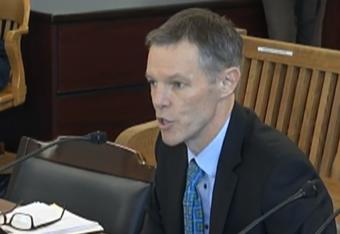
A state labor economist said the state government can control some of the factors that have caused the recession in Alaska to last more than three years.
Dan Robinson, the research chief for the state’s Department of Labor and Workforce Development, told the Senate Finance Committee Wednesday that the uncertainty over the size of state government and how the state is going to pay for it are contributing to the recession.
“If you’re a business, if you’re an individual, this unsolved problem has you sit on your wallet a little bit,” Robinson said.
Robinson also said the cost of some of the steps the state has taken over the past three years — like reducing state spending and cutting permanent fund dividends — has made the recession longer.
Robinson said there are signs that the recession is ending. They include growth in wages over the past year. In January, his department projected the state would add 1,400 jobs this year. But that was before Gov. Mike Dunleavy proposed closing a $1.6 billion budget gap. The proposal would cut spending, shift costs to local government and draw on reserves.
Robinson listed the areas where he would expect fewer jobs: local government, state government, health care, retail trade, and leisure and hospitality. He said the leisure and hospitality reduction would come from “not so much the tourism side of that, but the consumer spending side, the part that’s driven by Alaskans going out to eat in restaurants.”
Robinson said his department isn’t planning to produce a new forecast until next year. So lawmakers will have to rely on other sources to project the effect of Dunleavy’s proposed budget.
Andrew Kitchenman is the state government and politics reporter for Alaska Public Media and KTOO in Juneau. Reach him at akitchenman@alaskapublic.org.




